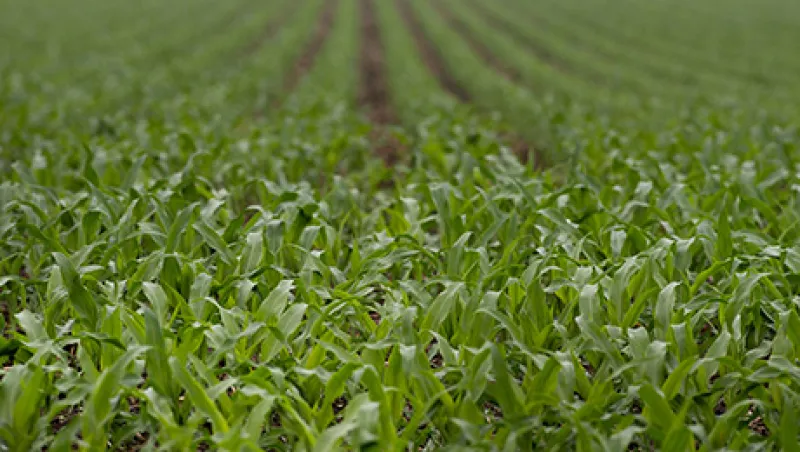The corn crop, climate change and commodities prices are three key issues featured in a report released today by Ceres, a Boston nonprofit that advocates sustainable investing. The report delineates mounting threats to sustained corn production in the U.S. and offers ways companies, and their investors, might be able to help forestall the worst outcomes.
“Corn is one of the most important food staples and fuel crops in the world,” says Brooke Barton, director of Ceres’ water program and lead author of the report, Water & Climate Risks Facing U.S. Corn Production: How Companies & Investors Can Cultivate Sustainability. “It’s also a case study in the risk related to climate change, water scarcity and water quality that is pervasive for many agricultural supply chains.”
Farmers netted $67 billion in revenue from corn in 2013, according to the report, and the largest 45 companies that rely on corn for some part of their value chains generated $1.7 trillion in revenue. Only one tenth of corn produced in the U.S. ended up in a meal last year; nearly three fourths was used for fuel or animal feed. Corn has a dominant presence across at least 19 U.S. industries.
Corn is a water-intensive crop, and as groundwater stores like the High Plains aquifer, which covers parts of eight states in the western Great Plains, continue to dwindle and droughts increase in frequency, corn crops look increasingly vulnerable. During the Midwest drought of summer 2012, corn prices shot to a record $8 per bushel, after hovering between $2 and $3 for most of the previous two decades.
Though extreme weather isn’t the only driver of corn price increases — rising demand, federal policy on ethanol production and commodity index swaps also play roles — Ceres’s Barton argues that climate change is underappreciated by companies and investors. Not only should these groups be accounting for the effects of weather in their sourcing, planning and investing, she says, but they could also have some sway in encouraging more sustainable farming practices.
“We are advising investors to ensure that the companies they have in their portfolios understand these risks, and that they’re working with farmers to do something about them,” she says. “The crux of that is more disclosure and transparency from companies.”
Bruce Kahn is an investor for whom the importance of what he calls “climactic disruption” as an investment theme isn’t news. Kahn is manager of a global equity portfolio focused on agribusiness at Sustainable Insight Capital Management (SICM), a New York–based asset management firm that targets opportunities that arise from global development issues such as urbanization, natural resource scarcity and climate change. Before SICM, Kahn spent four years as a director and sustainability research analyst at Deutsche Bank’s Deutsche Asset & Wealth Management.
“We have to stay abreast of how commodity prices are reacting to climactic variations, how that will affect the value chain and how we can position ourselves accordingly,” Kahn says. Especially subject to a heavy weather-risk rating are agribusiness portfolios. “There’s no other industry more on the front lines of climate change than agriculture,” he says, adding that weather risks are taken into account across all strategies at his firm.
Mainstream investors seem increasingly to share Kahn’s thinking that climate change represents a material factor to investment portfolios. In a recent PricewaterhouseCoopers survey of institutional investors representing $7.6 trillion in assets under management, 82 percent said they had considered climate change and/or resource scarcity in investment decisions in the past year, and 87 percent said they expected to take them into account over the next three years.
But Barton says more education is needed to help investors ask the right questions of portfolio companies and their suppliers.“I do think it’s early days for investors understanding what they should be asking of companies,” she says.
The Ceres report suggests three main actions to pursue: encourage sourcing from sustainably grown crops, that is, those that rotate and irrigate efficiently; join initiatives to support the adoption of best farming practices; and push for the use of grains other than corn whenever possible.
Barton adds that investors in agribusiness should be mindful particularly of the risk of stranded assets that could hit their portfolios if agriculture companies suddenly have to recalculate how much of their acreage is arable. About $9 billion worth of irrigated corn production in the U.S. relies on the shrinking High Plains aquifer, according to the report.
“Certainly, some of those places will not be sustaining corn, or any other water-intensive crop, for much longer,” she says. “Investors who may have some of those assets in their portfolios should be looking into that.”
Get more on alternatives.






